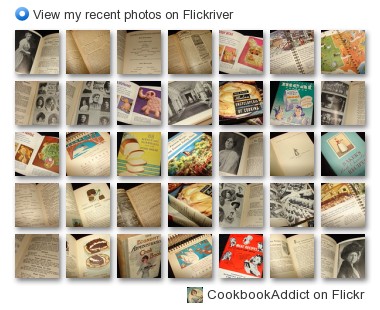 oing without.
oing without."In times of famine, war, and extreme hardship people have been known to eat things they might not consider during "normal" times. According to the food historians, the Great Depression was not such a period. Why? There was an ample, inexpensive food supply. People struggling to make and put food on the table had the option of purchasing lesser grades of meat (chuck instead of sirlion beef), cheaper cuts of animal (heart, brains, feet), and manufactured substitutes (Crisco instead of butter). Folks who needed help were served by private soup kitchens and government programs. These services were in place throughout the country."
 You hear the word "soup kitchen" and I automatically think about long lines of starving people waiting desperately for relief from their hunger. But what surprised me was reading that people had a good hearty bowl of soup along with bread and you were even able to go back for seconds and thirds. The hardtimes are only addressed in alot of 1930's cookbooks with "cutting back" and "streatching your dollar" chapters but no shocking ingredient recipes or stories and the same goes for magazine articles and other publications. Some of what I read was that people were "for the most part" playing it safe, as in not eating at fancy gourmet resturants but instead choosing family-type ones, or having coffee and milk over wine but I didn't realize that people were going out to eat all.
You hear the word "soup kitchen" and I automatically think about long lines of starving people waiting desperately for relief from their hunger. But what surprised me was reading that people had a good hearty bowl of soup along with bread and you were even able to go back for seconds and thirds. The hardtimes are only addressed in alot of 1930's cookbooks with "cutting back" and "streatching your dollar" chapters but no shocking ingredient recipes or stories and the same goes for magazine articles and other publications. Some of what I read was that people were "for the most part" playing it safe, as in not eating at fancy gourmet resturants but instead choosing family-type ones, or having coffee and milk over wine but I didn't realize that people were going out to eat all."The Depression also changed the way many Americans entertained at home. Except for the upper echelons of society, most families were now maidless, which made grand, formal dinner parties impossible. Instead, hostesses gave luncheons, teas, and cozy Sunday Night Suppers around the chafing dish...The Thirties aslo ushered in an era of women's clubs--whether dedicated to charitable activities, gardening, or the fine art of bridge"--Fashionable Food: Seven Decades of Food Fads, Sylvia Lovegren [Macmillan:New York] 1995 (p. 41-44)

But what about the scary newsreel reports and all of the haunting photos? Writing this post has completely gotten me intrigued, completely confused and wanting to talk to people that have actually been through this difficult time in American history. There seems to be only 2 views, one is how mind-numbingly terrible it was and the other is a "still bad but on a much lesser level". I cant help but wonder what the majority of America was experiencing on an everyday level. I know there are tons of differences(dustbowl,income,etc.) that affect peoples situations during this time but how bad was bad for the majority of people. There're are stories sorrounding my grandmother growing up in the 30's and having to eat lard sandwhiches and getting in big trouble with her father for making a peanut butter butter AND jelly sandwich as a child when she should've made just one or the other. The same lady who now hoards canned goods "just in case". Who better to talk to and get some answers, as thankfully and gratefully she's still with us and wants nothing more to visit and talk! Which gets me thinking about Grandparents and people from past generations in general. Being a huge history fan, what better resource to learn from than the ones that have gone through it first hand and have thier own unique perspective to share, what a precious resource we have and take for granted. Why do we not know more about exactly what it was like? Alot of people from my generation (late 70's:)seem to have a vauge generalization (including me) about the depression era and there's something so sad about that. Why are we not getting all of the normal everyday stories down, while the people that lived through them are still here? Their lives were not like ours today. To the people that lived through 2 world wars and the introduction of CARS, What were your dreams? What were YOUR grandparents days like? How did your parents meet? It's not enough just to have geneology lines drawn, there's stories that go with every single name on your family tree. Know them, write them down! There is DEFFINATLY more to come!


2 comments:
Looks good , i like this 1930's kitchen, i think this is better than modern kitchen because it's looking unique.
Fitted kitchens
What a great article ! Not so different from today I definately make a chicken last 3 meals from baking to soup to chicken salad.We almost never go out except to a diner once in a blue moon. I love historical novels just to get a glimpse of how life was too!Did you ever see that PBS show I think it was called "Victorian House" and they had to do everything just like the victorians including cooking and food prep etc - What hell !!!
Post a Comment